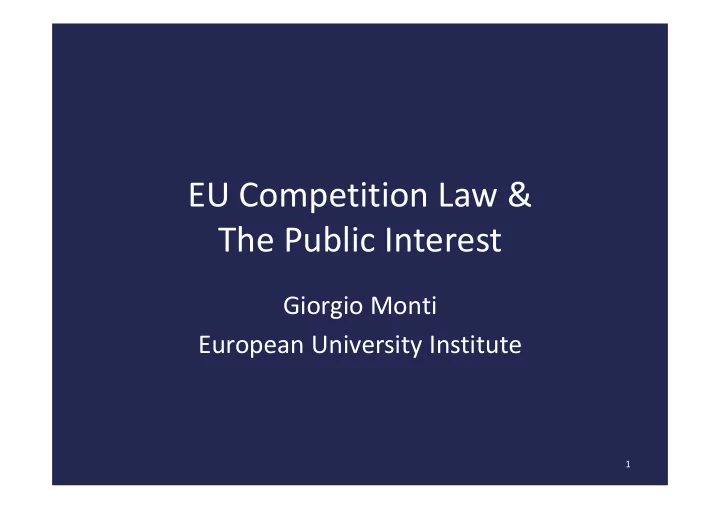

EU Competition Law & The Public Interest Giorgio Monti European University Institute 1
Wisdom from Tuscany In judging policies we should consider the results that have been achieved through them rather than the means by which they have been executed Niccolò Machiavelli 2
Diligent, effects ‐ based law ‐ making • Ex ante – Impact Assessment – State Aid exemption procedures (are you spending money wisely?) • Ex post – REFIT (Regulatory Fitness and Performance) – Scotch Whisky Association & Others v Lord Advocate [2013] CSOH 70 3
Corporate Power (& Responsibility?) ‘Corporations have economic power, which can be translated into social and political power.’ (p.197) 4
Implications for competition law Given that i. firms may behave in the public interest ii. we can monitor this just like we would monitor state regulation Then should we not read Article 101.3 TFEU widely? If not, why not? 5
Why Not • The Treaty forbids it • Art 101.3 as efficiency defence is a reasonable reading • There would be no workable limit to the benefits persons would claim • There would be no workable means of carrying out the balancing exercise • An efficiency defence is more appropriate to ensure convergence 6
Commission Practice since 2004 • ‘Honey, I Shrunk the Article’ – Art.101 Guidelines (general 2004, horizontal 2010) • Deterrence, but not insolvency – Fining Guidelines (2006) • Out ‐ of market efficiencies can be considered: exceptionally, somehow – Air Canada/United/Lufthansa (Star Alliance) (23 May 2013) 7
Messages from the judges • We can overrule guidelines ( Expedia ) • Competition distortions harm the public interest, individual undertakings and consumers ( Telia Sonera ) • Protection of cultural diversity is an element which the Commission must take into account when it applies Article 101.1 and… is to be ‘borne in mind’ when considering Article 101.3 (Case T ‐ 451/08 Stim ) • Agreements that prevent over ‐ indebtedness and increase credit may benefit from Article 101.3 ( Asnef ‐ Equifax ) 8
Social welfare in state aid law • Common Principles for an Economic Assessment of the Compatibility of State aid Under Article [107(3) TFEU] (draft, 2009) – Does the measure contribute to overall welfare or to more equitable results? – Is it well ‐ designed (appropriate instrument, effective, proportionate)? – Is overall balance positive? 9
Objection! By monetizing the things we hold most dear, economic analysis ends up cheapening and belittling them. (p.40) 10
Input legitimacy as an alternative? Q. What do the Dutch Bar Association, the International Swimming Federation and the Portuguese Order of Chartered Accountants have in common? A. When they regulate their market and issue restrictive regulations, Article 101 is not applicable if the restriction is inherent in the pursuit of the public interest & proportionate. 11
When does the Wouters rule apply? Scope of application (undefined) – The state entrusts them with duties? – The procedures are participative/inclusive? – The association has a public interest mission (CSR)? – Credence goods? Testing the rules – General objective of the rules – Inherency of restrictive effects – Proportionality 12
Judicial review under Wouters : from marginal to intense Case C ‐ 309/99 Wouters Case C ‐ 1/12 OTOC • Regulation preventing • Exclusion not necessary to multi ‐ disciplinary practices guarantee quality, there is a less restrictive option: ‘a monitoring system ‘could therefore reasonably organised on the basis of be considered to be clearly defined, transparent, necessary in order to non ‐ discriminatory ensure the proper practice reviewable criteria likely to of the legal profession’ ensure training bodies equal access to the market’ 13
Wouters rule : known unknowns • Wide or narrow scope? – ‘private voluntary measures’ (AG Mazák in Pierre Fabre ) • What kinds of justifications? – ‘the legitimate objective must be of a public law nature’ (AG Mazák in Pierre Fabre ) • Can we draw from the Art 4(3) TEU + 101 TFEU cases? – Like in Reiff , for example. • Can you apply both Wouters and 101.3 to the same facts? – You can try ( OTOC ) • Can Wouters apply when the decision eliminates competition? – Yes (see OTOC) 14
Pop Quiz: who wrote this? The pretence that corporations are necessary for the better government of the trade, is without any foundation… the policy of Europe [restrains] competition in some employments… 15
Two approaches to the same question? Output Input legitimacy legitimacy (101.3) ( Wouters ) 16
Let the Dutch Experiment • The EU is a site for experimentalist governance... • ...but not in competition law? – ICN: superior approaches (with some informed divergence) – ECN: convergence – Modernisation White Paper: procedural & substantive reform 17
Reform Regulation 1? • No clean procedure for NCAs to declare that agreements do not infringe competition law – Negative decision by NCA not allowed ( Tele 2 ) – Only Commission may issue negative decisions (Reg 1, Art 10) – Possible in commitment decisions, but no legal certainty, over ‐ commitment risks ( Alrosa ) 18
Recommend
More recommend